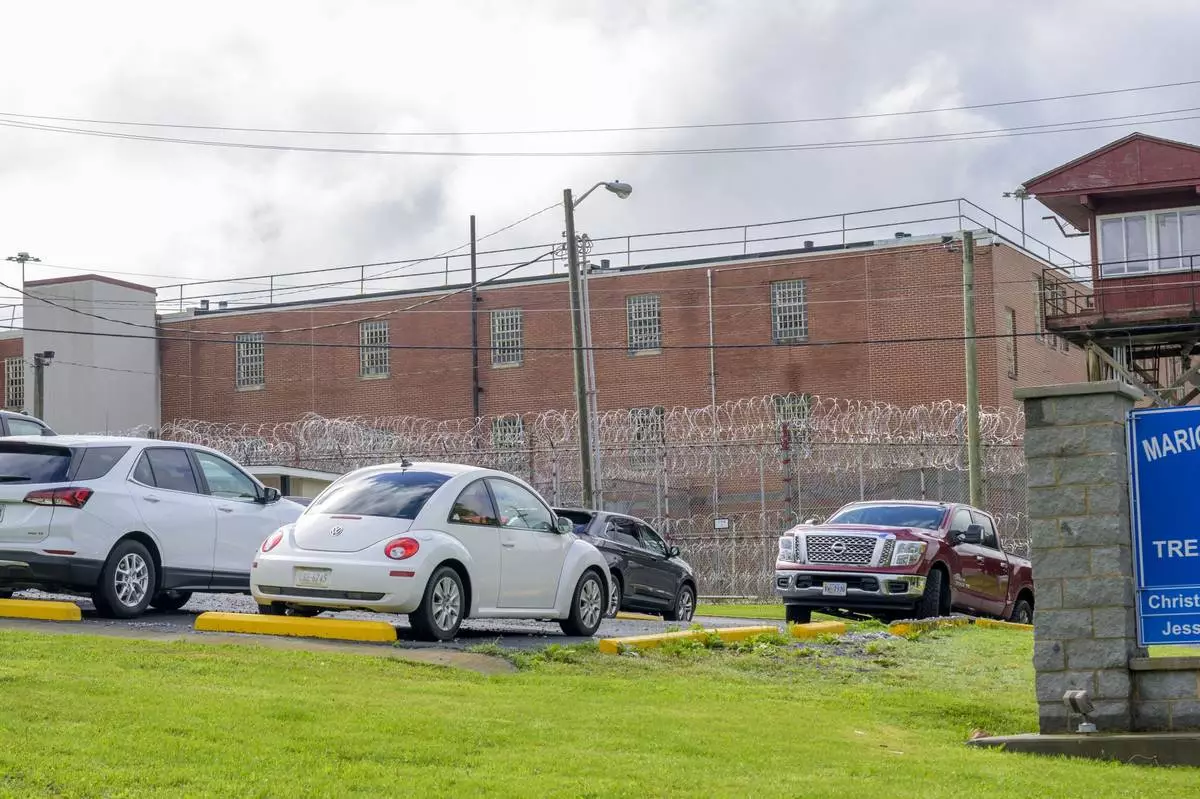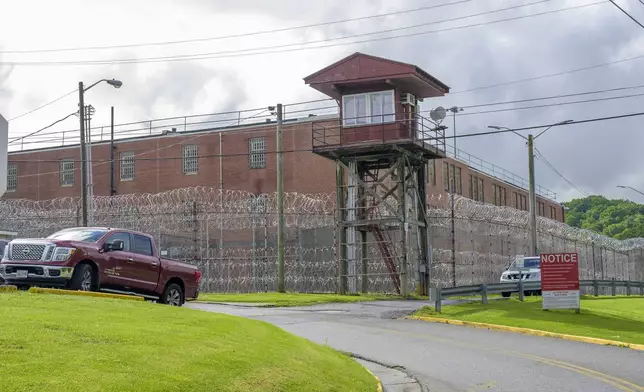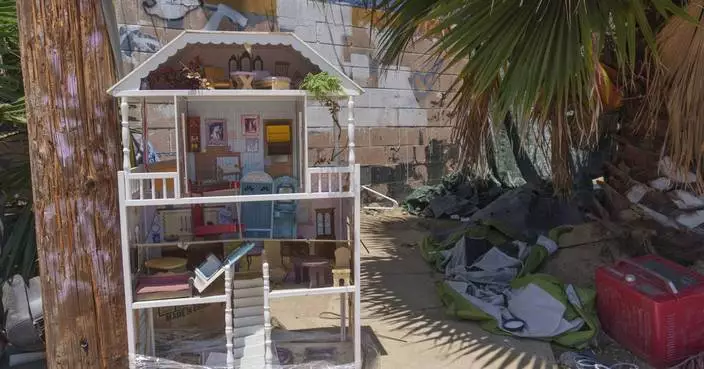RICHMOND, Va. (AP) — The Virginia State Police investigator seemed puzzled about what the inmate was describing: “unbearable” conditions at a prison so cold that toilet water would freeze over and inmates were repeatedly treated for hypothermia.
“How do you get hypothermia in a prison?” the investigator asked. “You shouldn’t.”
The exchange, captured on video obtained by The Associated Press, took place during an investigation into the death of Charles Givens, a developmentally disabled inmate at the Marion Correctional Treatment Center, who records show was among those repeatedly hospitalized for hypothermia.
After a special grand jury considered the case but opted not to bring criminal charges, Givens' sister sued in federal court, alleging her brother was subjected to routine mistreatment, including “cold-water torture,” before he was fatally beaten in 2022.
The lawsuit has raised broader questions about conditions at the southwest Virginia prison, which the grand jury described as “inhumane and deplorable.”
The AP obtained records showing inmates at Marion, which houses predominantly mentally ill offenders, were hospitalized for hypothermia at least 13 times in three years during cold-weather months while medical providers expressed concern about temperatures at the prison.
“I am hopeful it may warm up some before fall officially sets in ... but the colder temperatures make this specific population vulnerable to hypothermia and possibly pneumonia," a nurse practitioner at the prison wrote in September 2020. “I know we are always trying to avoid hospital runs and such.”
Medical providers at the prison raised the prospect that the anti-psychotic medicines some inmates were taking could have played a role in their hypothermia hospitalizations, according to the records. But medical experts not connected to the prison said that type of side effect is rare and the number of hospitalizations should have been a cause for concern.
“There’s something unusual about the circumstances that would be leading to this high number of hospitalizations for this condition that otherwise is really, really unusual, really rare," said Dr. Fred Jarskog, a professor of psychiatry at UNC-Chapel Hill and research director of the North Carolina Psychiatric Research Center. "I can say that with a lot of confidence."
Jarskog said he has spent 30 years treating patients with anti-psychotics and encountered “maybe” one episode of hypothermia. Even a single case of hypothermia in a patient at the hospital where he works would prompt discussion. Figures like what the DOC has seen would prompt “a massive investigation," he said.
Kyle Gibson, a spokesman for the Virginia Department of Corrections, repeatedly declined to answer questions about what the records showed or to address prison conditions, citing the pending litigation. He did not acknowledge an AP request to interview the facility's warden or another DOC official with oversight of Marion.
The Department of Corrections and attorney general's office previously withheld documents the AP sought under the state's open-records law related to Givens' death and inmate complaints about cold temperatures.
In addition to mentally ill inmates, the Marion prison houses general population offenders, such as the person seen speaking with the investigator in the video, who provide support services including maintenance and cleaning.
A state procurement document from 2018 for renovations that would include an HVAC system replacement said no major improvements had been made to the building since its core structures were built in 1955.
In the video exchange obtained by the AP, the inmate told the state police investigator there was no functional heat in at least one part of the prison, leading to “unbearable” indoor temperatures he estimated were in the 40s Fahrenheit (4.4 to 9.4 Celsius) or “maybe high 30s” (3.3 to 3.8 Celsius) in the cells he cleaned.
The prisoner also alleged officers would open exterior windows as a form of punishment, exacerbating the cold temperatures. The allegation is echoed in the lawsuit, which argues hypothermia without outdoor exposure is uncommon. The inmate said he had seen at least six people being treated for hypothermia.
The U.S. Centers for Disease Control and Prevention warns that hypothermia, which can be fatal, is most likely at very cold temperatures, but can happen at cooler temperatures above 40 degrees (4.4 Celsius) if a person is chilled from water.
Emails and other documents obtained by the AP show medical workers at the prison discussing cold conditions and expressing concern about making sure the housing unit windows were closed and blankets were available.
In court records obtained by the AP, an institutional investigator, who said he had worked at the prison for decades and reported to the warden, stated the part of the facility where Givens was housed stayed colder than other parts. The investigator indicated he wouldn't be surprised to hear of hypothermia complaints.
Givens was hospitalized for hypothermia five times over the last year of his life.
“I understand we all have concerns about Mr. Givens' care,” a prison nurse remarked in one email exchange.
Broadly, the records echo similar, previously disclosed concerns about the facility.
A special grand jury impaneled at the request of the top local prosecutor in 2022 found Givens’ death “suspicious,” also saying in a report that “nearly every witness” described living conditions in the prison sector housing mentally ill inmates as “unsuitable.”
“More than one witness had observed ice formed on the water in toilets. We find these conditions to be inhumane and deplorable,” the report said.
The grand jury concluded it lacked sufficient evidence to support an indictment in Givens' death but said the case should be reconsidered “should other evidence come to light.” The five officers named in the civil complaint all have denied the allegations of torture and other misconduct, according to court documents.
As the lawsuit over Givens' death plays out, the Office of the Attorney General, which is representing two additional defendants who held supervisory roles at the prison, has sought unsuccessfully to block additional discovery into the issues of hypothermia or allegations of cold exposure.
The office argued in court documents that because an autopsy found Givens died of blunt-force trauma, “additional discovery into incidents unrelated or at best loosely related to Mr. Givens’ death will unnecessarily multiply these proceedings.”
Last month, a magistrate judge denied the attorney general's motion.
The AP made multiple attempts by email to reach the defendants’ attorneys, seeking comment on the case and allegations of cold temperatures. None responded to the inquiries, except for a spokeswoman for the attorney general's office, who declined to comment, citing the pending lawsuit.
Mark Krudys, an attorney for Givens’ sister, Kym Hobbs, declined to comment on the AP's findings.
Givens was serving time for the 2010 fatal shooting of a woman who was employed as a home health nurse for his mother. As a child, Givens sustained a traumatic brain injury after falling down a flight of stairs and his intellectual and emotional development was limited to that of a second grader or third grader, according to the lawsuit.
Givens also had Crohn’s disease, which caused him to sometimes defecate on himself, a factor attorneys for his sister say made him a target for abuse.
In July, the AP reported the FBI was looking into his death.
The civil trial has been set for January.
Associated Press reporter Denise Lavoie contributed to this report.

The Marion Correctional Treatment Center is shown Thursday, May 16, 2024, in Marion, Va. A lawsuit over a Virginia prison inmate's death has raised broader questions about conditions at the lockup, and newly obtained records are now providing further insights. The records obtained by The Associated Press show inmates at the Marion Correctional Treatment Center, which houses predominantly mentally ill offenders, were hospitalized for hypothermia at least 13 times in three years. (AP Photo/Earl Neikirk)

The Marion Correctional Treatment Center is shown Thursday, May 16, 2024, in Marion, Va. A lawsuit over a Virginia prison inmate's death has raised broader questions about conditions at the lockup, and newly obtained records are now providing further insights. The records obtained by The Associated Press show inmates at the Marion Correctional Treatment Center, which houses predominantly mentally ill offenders, were hospitalized for hypothermia at least 13 times in three years. (AP Photo/Earl Neikirk)

The Marion Correctional Treatment Center is shown Thursday, May 16, 2024, in Marion, Va. A lawsuit over a Virginia prison inmate's death has raised broader questions about conditions at the lockup, and newly obtained records are now providing further insights. The records obtained by The Associated Press show inmates at the Marion Correctional Treatment Center, which houses predominantly mentally ill offenders, were hospitalized for hypothermia at least 13 times in three years. (AP Photo/Earl Neikirk)

The Marion Correctional Treatment Center is shown Thursday, May 16, 2024, in Marion, Va. A lawsuit over a Virginia prison inmate's death has raised broader questions about conditions at the lockup, and newly obtained records are now providing further insights. The records obtained by The Associated Press show inmates at the Marion Correctional Treatment Center, which houses predominantly mentally ill offenders, were hospitalized for hypothermia at least 13 times in three years. (AP Photo/Earl Neikirk)

The Marion Correctional Treatment Center is shown Thursday, May 16, 2024, in Marion, Va. A lawsuit over a Virginia prison inmate's death has raised broader questions about conditions at the lockup, and newly obtained records are now providing further insights. The records obtained by The Associated Press show inmates at the Marion Correctional Treatment Center, which houses predominantly mentally ill offenders, were hospitalized for hypothermia at least 13 times in three years. (AP Photo/Earl Neikirk)

The Marion Correctional Treatment Center entrance sign is shown Thursday, May 16, 2024, in Marion, Va. A lawsuit over a Virginia prison inmate's death has raised broader questions about conditions at the lockup, and newly obtained records are now providing further insights. The records obtained by The Associated Press show inmates at the Marion Correctional Treatment Center, which houses predominantly mentally ill offenders, were hospitalized for hypothermia at least 13 times in three years. (AP Photo/Earl Neikirk)

The Marion Correctional Treatment Center is shown Thursday, May 16, 2024, in Marion, Va. A lawsuit over a Virginia prison inmate's death has raised broader questions about conditions at the lockup, and newly obtained records are now providing further insights. The records obtained by The Associated Press show inmates at the Marion Correctional Treatment Center, which houses predominantly mentally ill offenders, were hospitalized for hypothermia at least 13 times in three years. (AP Photo/Earl Neikirk)

The Marion Correctional Treatment Center is shown Thursday, May 16, 2024, in Marion, Va. A lawsuit over a Virginia prison inmate's death has raised broader questions about conditions at the lockup, and newly obtained records are now providing further insights. The records obtained by The Associated Press show inmates at the Marion Correctional Treatment Center, which houses predominantly mentally ill offenders, were hospitalized for hypothermia at least 13 times in three years. (AP Photo/Earl Neikirk)


















